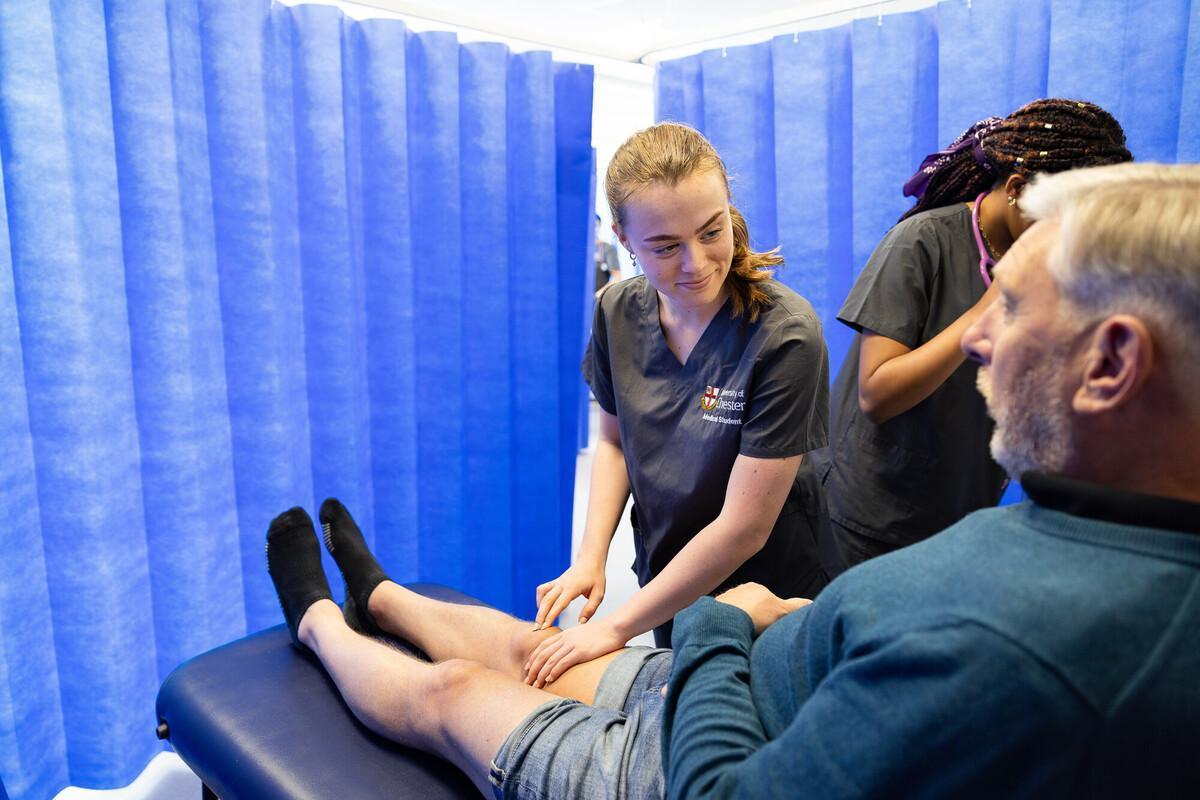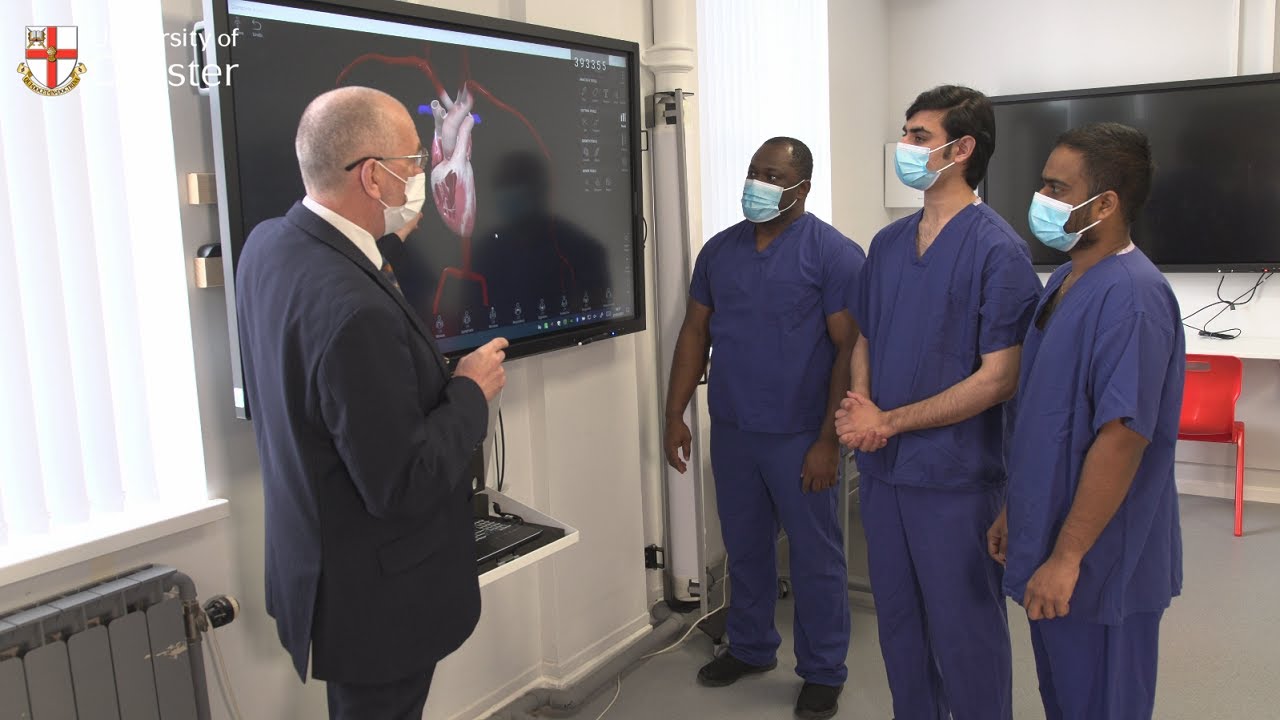2:1honours degree
- At least an upper second class honours (2:1) degree in any subject.
- Candidates with a lower second class degree should hold either a Master's or a Doctoral qualification to be considered.
- In the case of an Intercalated Master's eg. MEng/MPharm, the equivalent of a Pass grade or above at Master's level (minimum 2:2).
- If you are starting or have started the final year of an undergraduate entry degree then you can apply, but please be aware that any offer will be conditional on you achieving a 2:1 or above. Similarly, if you have a 2:2 and are about to commence or you have already commenced a Master’s degree any offer will be conditional on successful award of a Master's degree.
- Meeting the minimum threshold mark in either UCAT, GAMSAT or MCAT. The minimum threshold scores fluctuate annually and will be set above the national mean.
- We require you to have completed at least 70 hours of work experience relevant to medicine. By 'relevant', we mean roles which give you an insight into the work of the NHS or other healthcare system, the role of a doctor or other health professional, and the perspective of patients or carers.
For the 2026-27 admissions cycle (2027 entry), we accept work experience gained over the last 3 years (15th October 2023 to 15th October 2026).
If you are training or working as a health professional with direct patient/service user contact, we require evidence of your training or work plus an online/virtual 'work experience' course such as this free one from Brighton & Sussex Medical School: https://bsmsoutreach.thinkific.com/courses/VWE
If you are not training or working as a health professional, with direct patient/service user contact you must demonstrate at least two relevant work experiences.
-
- One work experience must be in a role with direct hands-on care of people/patients with healthcare needs (paid or voluntary).
- The other role(s) can be shadowing a health professional in the course of their work or completion of an online/virtual ‘work experience’ course such as this free course provided by Brighton & Sussex Medical School: https://bsmsoutreach.thinkific.com/courses/VWE
- Note that an online course can only count for a maximum of 10 hours towards the total 70 hours minimum work experience.
- Applicants must provide one reference from a person (not a relative or friend) who holds/has held a position of responsibility and who can comment on the applicants suitability for studying medicine. If the applicant has been in higher education in the last two years prior to application, an academic reference should be provided.
- At Chester we do not consider applications from those with previous academic failure at medical (or dental) school. For those with other, genuine reasons for needing to leave medical school, we consider these on a case-by-case basis and always contact the previous medical school for confirmation. Entry is only into Year 1 via the standard admissions process.
- All applicants who successfully meet the academic criteria and entry test standards will be required to attend for interview. The interview process lasts approximately one and a half hours and takes the form of six Multiple Mini Interviews (MMIs). The detail of the stations will change each year, but all are designed to assess against GMC guidance on ‘Good Medical Practice’. You will be observed and scored at each station by two trained assessors. Assessors come from a range of backgrounds and include medical professionals, academics, current students and lay people with an interest in medical education. On completion of the MMI process, each candidate's score profile is carefully reviewed to determine which candidates will be made an offer.
- All successful applicants must declare any and all, past or current, health, welfare and conduct issues that may affect an individual's fitness to study medicine and practise as a doctor following successful completion of the course.
- All successful applicants will be required to apply for an Enhanced Disclosure from the Disclosure and Barring Service (DBS), payable by the applicant. International applicants will need to provide evidence from the country they are residing by following the advice provided on the DBS website.
Disclaimer: Please be aware we are not able to give individual feedback from our selection process.
The minimum threshold scores fluctuate annually and will be set above the national mean.
Occupational Health
You will not be able to be involved with NHS patients in the United Kingdom unless you are cleared by our occupational health (OH) provider, Innovate Health Care.
Before coming to the UK to study medicine, Chester Medical School requires that all students meet the immunisation and screening standards required for working in the National Health Service (NHS) as required by the UK Department of Health.
The first part of the clearance process is the completion of the online health questionnaire. The second part is a health screening that includes ensuring that you have received the vaccinations as required by the UK Department of Health.
- You will be required to undertake health screening, which involves blood screening for immunity and infection, as well as confirming your vaccination status and completing further vaccinations if required
An appointment with our Occupational Health (OH) provider will be arranged for you at the start of your training and before you undertake any clinical placements.
Attendance at your OH appointment is mandatory, and you will need to show photo ID when you attend your appointment such as a driving licence or passport.
We cannot force you to have a vaccination and there will be some students who are exempt. However, it is unlikely that OH will recommend that you are fit for clinical placements if you have not had the appropriate vaccinations. This may mean that your offer of a place on the programme may be withdrawn.
It is highly recommended that you are immunised against the following if you do not already have immunity to them:
| Vaccination | Recommendations |
|---|---|
| Tetanus, Polio and Diphtheria (combined) | Up to date (childhood record). |
| Measles, Mumps and Rubella (MMR) |
This is particularly important to avoid transmission to vulnerable groups. Evidence of satisfactory immunity to MMR is either:
|
| Bacillus Calmette–Guérin (BCG) | Recommended if staff/students have close contact with infectious tuberculosis (TB) patients. |
| Hepatitis B |
|
| Varicella (chickenpox) |
Required if staff/students have direct patient contact and:
|
| Influenza | The annual influenza vaccine will be offered to students directly involved in patient care. |
Please bring with you any records with details of your immunisations including dates of administration.
Please note that although we do not mandate Covid-19 or influenza immunisation we advise you to have your booster vaccinations to protect you, your colleagues and patients.
Throughout your programme we may need to seek independent advice from our occupational health provider and refer you to their services. This may involve further vaccinations or other appropriate interventions.
It is important that you are truthful when completing your online health questionnaire. Dishonesty is incompatible with training regulated by the General Medical Council and may result in a Fitness to Practise referral.
The University of Chester adheres to the principles of the Data Protection Act 2018 and the GMC Code of Confidentiality.
2:1honours degree
- At least an upper second class honours (2:1) degree in any subject.
- Candidates with a lower second class degree should hold either a Master's or a Doctoral qualification to be considered.
- In the case of an Intercalated Master's eg. MEng/MPharm, the equivalent of a Pass grade or above at Master's level (minimum 2:2).
- If you are starting or have started the final year of an undergraduate entry degree then you can apply, but please be aware that any offer will be conditional on you achieving a 2:1 or above. Similarly, if you have a 2:2 and are about to commence or you have already commenced a Master’s degree any offer will be conditional on successful award of a Master's degree.
- Meeting the minimum threshold mark in either UCAT, GAMSAT or MCAT. The minimum threshold scores fluctuate annually and will be set above the national mean.
- Applicants will be required to provide references to evidence work experience if invited to attend a selection centre: 70 hours (the equivalent of around ten days’) of prior work experience in a healthcare or allied setting, as a volunteer, or in a paid capacity, as a helper to someone with healthcare needs. Evidence of experience working in a healthcare environment can include being a Care Assistant in a care home/hospital, a volunteer in a hospital, visiting someone in their home to care for them, and working in a hospital lab or other healthcare setting. This work experience must have taken place in the 3 years prior to the date of application. Shadowing a doctor/healthcare professional can only count for a maximum of 20 hours against the minimum requirement of 70 hours. Applicants for 2024 entry may apply without the required 70 hours however they must be working towards it. It would then become a condition if an offer was made.
- Applicants must provide one reference from a person (not a relative or friend) who holds/has held a position of responsibility and who can comment on the applicants suitability for studying medicine. If the applicant has been in higher education in the last two years prior to application, an academic reference should be provided.
- At Chester we do not consider applications from those with previous academic failure at medical (or dental) school. For those with other, genuine reasons for needing to leave medical school, we consider these on a case-by-case basis and always contact the previous medical school for confirmation. Entry is only into Year 1 via the standard admissions process.
- All applicants who successfully meet the academic criteria and entry test standards will be required to attend for interview. The interview process lasts approximately one and a half hours and takes the form of six Multiple Mini Interviews (MMIs). The detail of the stations will change each year, but all are designed to assess against GMC guidance on ‘Good Medical Practice’. You will be observed and scored at each station by two trained assessors. Assessors come from a range of backgrounds and include medical professionals, academics, current students and lay people with an interest in medical education. On completion of the MMI process, each candidate’s score profile is carefully reviewed to determine which candidates will be made an offer.
- All successful applicants must declare any and all, past or current, health, welfare and conduct issues that may affect an individual's fitness to study medicine and practise as a doctor following successful completion of the course.
- All successful applicants will be required to apply for an Enhanced Disclosure from the Disclosure and Barring Service (DBS), payable by the applicant. International applicants will need to provide evidence from the country they are residing by following the advice provided on the DBS website.
Disclaimer: Please be aware we are not able to give individual feedback from our selection centre process.
The minimum threshold scores fluctuate annually and will be set above the national mean.
Occupational Health
You will not be able to be involved with NHS patients in the United Kingdom unless you are cleared by our occupational health (OH) provider, Innovate Health Care.
Before coming to the UK to study medicine, Chester Medical School requires that all students meet the immunisation and screening standards required for working in the National Health Service (NHS) as required by the UK Department of Health.
The first part of the clearance process is the completion of the online health questionnaire. The second part is a health screening that includes ensuring that you have received the vaccinations as required by the UK Department of Health.
- You will be required to undertake health screening, which involves blood screening for immunity and infection, as well as confirming your vaccination status and completing further vaccinations if required
An appointment with our Occupational Health (OH) provider will be arranged for you at the start of your training and before you undertake any clinical placements.
Attendance at your OH appointment is mandatory, and you will need to show photo ID when you attend your appointment such as a driving licence or passport.
We cannot force you to have a vaccination and there will be some students who are exempt. However, it is unlikely that OH will recommend that you are fit for clinical placements if you have not had the appropriate vaccinations. This may mean that your offer of a place on the programme may be withdrawn.
It is highly recommended that you are immunised against the following if you do not already have immunity to them:
| Vaccination | Recommendations |
|---|---|
| Tetanus, Polio and Diphtheria (combined) | Up to date (childhood record). |
| Measles, Mumps and Rubella (MMR) |
This is particularly important to avoid transmission to vulnerable groups. Evidence of satisfactory immunity to MMR is either:
|
| Bacillus Calmette–Guérin (BCG) | Recommended if staff/students have close contact with infectious tuberculosis (TB) patients. |
| Hepatitis B |
|
| Varicella (chickenpox) |
Required if staff/students have direct patient contact and:
|
| Influenza | The annual influenza vaccine will be offered to students directly involved in patient care. |
Please bring with you any records with details of your immunisations including dates of administration.
Please note that although we do not mandate Covid-19 or influenza immunisation we advise you to have your booster vaccinations to protect you, your colleagues and patients.
Throughout your programme we may need to seek independent advice from our occupational health provider and refer you to their services. This may involve further vaccinations or other appropriate interventions.
It is important that you are truthful when completing your online health questionnaire. Dishonesty is incompatible with training regulated by the General Medical Council and may result in a Fitness to Practise referral.
The University of Chester adheres to the principles of the Data Protection Act 2018 and the GMC Code of Confidentiality.
World Directory of Medical Schools
Sponsorship for the World Directory for the US and Canada will follow once we receive full approval with the GMC for the University of Chester to award a primary medical qualification in the final year of the programme in 2028.
Note that, until this is obtained, currently CMS students cannot take the USMLE. We advise that applicants/students wishing to work in jurisdictions where USMLE is required consult the World Directory and relevant sponsoring organisations on a regular basis to check eligibility.
English Language Requirements
International applicants will be required to submit an English Language test certificate confirming a score of (or equivalent to) IELTS 7.0 with a maximum of two component scores at 6.0 or 6.5.
Please note, we do not accept University of Chester in-country English Language Tests for the MBChB course.



.jpg)

































